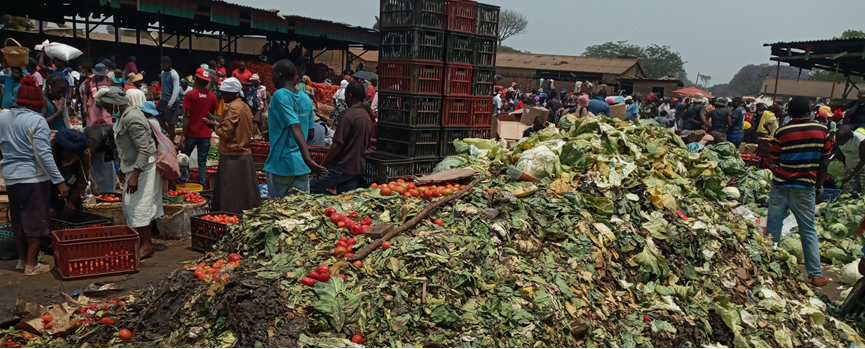By Charles Dhewa
In spite of efforts to improve market linkages and direct income to farmers, most African markets continue to be constrained by a disorganized supply of commodities. While the main problem with formal markets like supermarkets is taking fewer volumes and paying farmers peanuts after a long time, for open markets a major handicap is the lack of standard guidelines for diverse commodities flowing into the market daily.
This increases post-harvest losses. As if that is not enough, there are no defined roles and responsibilities – a farmer can be a trader, one can be a farmer- trader or a trader can masquerade as a farmer. Besides rendering the movement of commodities chaotic, becomes difficult to understand the whole ecosystem.
Rampant exploitation of farmers
Due to circumstances beyond their control, farmers tend to be exploited in the market especially by local authorities through limiting trading hours. For example, in the Mbare market of Harare, farmers are expected to sell all their commodities within five hours (5 am to 12 pm) irrespective of quantities the farmer will have brought to the market and market performance on that particular day.
Among those coming up with marketing by-laws, no one has ever traded commodities worth USD1000 within five hours. If a farmer brings 200 sacks of butternuts selling at USD50, s/he is expected to sell the whole consignment worth USD1000 from 5 am to 12 pm. Where can you find a business worth USD1000 being done within five hours?
This is the scenario in most African urban markets where, as time moves, farmers are forced to offer their commodities at give-away prices. In fact, there is a deliberate stance by middlemen to wait for the closing time and start buying when farmers have no option. The same happens in the morning as the market opens for trading.
Middlemen rush to buy from farmers when farmers are not sure about the quantities of commodities coming into the market that day in terms of whether the quantities will push prices up or down. As farmers become risk-averse, they offer commodities to middlemen only for prices of the same commodities to start rising when farmers are still in the market but will have sold to middlemen. Pressures on the farm also force farmers to give their commodities to middlemen before the market settles only to discover that prices may actually increase after just a few hours.
Opportunities for using the market to manage shocks
An ideal situation, being explored by eMkambo across Africa is where the market is able to control shocks. This entails creating a closed market where, contrary to the open market where all commodities that come on the day are sold in a hurry, the closed market regulates the flow of commodities into the market in line with demand through a booking system. Rather than every farmer coming to the market, the market should sell commodities on behalf of the farmers who should spend more time doing what they know best. That is how competition between farmers or suppliers can be managed and avoid cases where buyers take advantage of the competition between farmers or suppliers.
A closed market also reduces the opportunity cost incurred by farmers by spending a lot of time selling their commodities. If the amount of time wasted by farmers in the market is taken back to the farm, it contributes to increased production on the farm. For instance, if a single farmer takes 24 hours selling his/her commodities that is a whole day spent on the market. If two hundred farmers spend the same time selling their commodities, that is two hundred days (almost a year) of time spent in market-related activities which could have been saved through organized marketing.
The significance of defining roles and responsibilities
The market system being explored by eMKambo will show the significance of defining roles and responsibilities along food supply chains. This will also assist in setting up a traceability system so that farmers do not just come, sell and go with no one tracing the movement of farmers and commodities so that recourse is found when things go wrong. Defining roles and responsibilities also enables the market to build business profiles of farmers and other producers.
In many African countries, smallholder farmers have been in business for many years but there is nowhere where their profiles are kept. If the market captures and consolidates farmer profiles, it becomes easy to build business models with other actors like equipment providers and input suppliers.
In addition, consumption trends captured by the market should inform production needs as designed by the market. Currently, that knowledge is with traders and vendors. There is no one consolidating that knowledge and conveying it appropriately to farmers. Where you see a vendor picking different commodities from farmers and traders s/he is demonstrating signals of consumption patterns and preferences. Such details should be consolidated for the benefit of farmers and policymakers.
Optimal use of resources due to market-driven production
It is not enough to worry about farmers making a loss due to poor markets. Major losses incurred by African countries are in the form of natural resources like soil nutrients and water.
To what extent are African countries losing natural resources due to uneconomic prices on the market as a result of poor information regarding the right varieties and quantities needed by the market? Organized markets can also inform and guide seed manufacturers who exploit farmers’ lack of comparative information to promote seed varieties that have not been tested and validated by the market.
These companies are just using field days to mislead and misinform farmers. Market-related production should lead to optimal use of resources on the production side. What is produced should be demanded by the market at an optimal price. Farmers cannot just produce cabbages because somebody told them they made money last season only to get uneconomical prices due to gluts.






